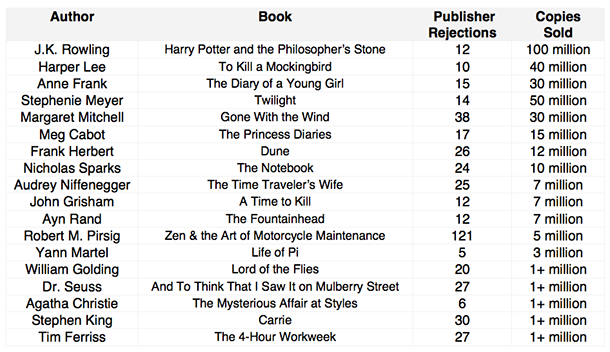Rejected By 12 Publishers. The Most Successful Book Series in History.
“You know you’ve found the hidden wisdom in your deepest scar when you view it as your greatest gift.” — J.K. Rowling
At the risk of incurring what might, on the length of the “disappointment scale,” range anywhere between seething rage and a slight frown, I want to preface this post by being upfront and letting you know that I’m not really a fan of Harry Potter.
Before you write that angry email, hear me out: I’m fond, yes. A fanatic, no.
A woman I used to work with once joked that I could never be her friend if I didn’t like Harry Potter, and my only redeeming quality was my reverence for HBO’s Game of Thrones. While I never got far into the films or books, my feelings for Harry Potter are somewhat similar to my feelings towards Shakespeare’s body of work: I can recognise its brilliance, I can see why others love it, I can love that others love it, but it largely doesn’t connect with me on a deep emotional level.
What does connect with me deeply and genuinely is the inspiring story of the woman who gave birth to this cultural force, this monster, so powerful and disturbing in its psychological magic that not being a true devotee is (almost) enough to thwart a professional friendship.
Are you a fan of “famous failure” stories? I am. Plenty of them are “cheesy,” sure, though I think it’s a terribly sad state of affairs in our society where attempts at heartfelt sincerity are often viewed as silly or weak. On the contrary. Inspirational stories such as these remind us of what is arguably, and often argued for, as the most important human virtue: courage, the warrior spirit. Rowling’s story of struggle to make it as a bona fide author and lift herself out of poverty is about as dark and, in the end, as glorious as it gets.
There’s every chance you may be on the verge of yawn territory, already very much aware of her path from rags to riches. If you are wondering why I would waste my time and yours retracing something that everyone knows, I would answer you with a possibly-more-obscure-than-you’d-like Sci-Fi film reference. There’s a scene I love at the very end of Joss Whedon’s Serenity (2005), where the captain of the spaceship is explaining the most important rules of flying to a crew member with psychic mind-reading abilities, who already knows what he’s going to say, but explains that she enjoys hearing him tell the tale anyway. That’s it.
Because her story is amazing, and because I love telling it, and I hope you like (re)hearing it …

Penniless Writer Dreams Up Culture Shifting, Multi-Billion Dollar Wizard School Idea Thing — And Nearly Doesn’t Change the World
Before she achieved the highest possible level of creative success as the proud author of the best-selling book series in history (not children’s book series, but book series), Joanne Rowling was a single mother on welfare, self-described as “the biggest failure I knew” and “as poor as it is possible to be in modern Britain, without being homeless,” who wrestled with deep depression, most acute between the ages of 25 and 28, to the point where she seriously contemplated suicide.
Following the devastating death of her mother and after an “exceptionally short-lived marriage had imploded,” Rowling, depressed, alone, and jobless, pursued her passion and the one thing she knew how to do truly well — writing — much of which took place in cafés with Jessica sleeping in a pram, her beloved daughter for whom she would skip meals to ensure was kept healthy. Rowling was so poor, the story goes, that she manually typed out multiple versions of the first manuscript because she couldn’t afford the cost of photocopying.
It was on a delayed train ride from Manchester to London in 1990 that the idea — the legendary “moment of conception” — for Harry Potter exploded into consciousness. More excited about the unfolding story-concept than any she’d had before, but too shy to ask anyone on the train for a pen, she allowed the image of a boy going to wizard school who doesn't know he's a wizard to ferment in her imagination for the full 4-hour journey. Immediately she began writing down the flood of ideas once home. The manuscript was finished 5 years later, slowly etched out with an old manual typewriter.
Here’s the crazy part: The first Harry Potter novel was rejected by 12 publishers, a fact almost barely comprehensible given its evident status as a global phenomenon. That the novel got off the ground at all seems owed, not to any keen-eyed adult who immediately foresaw its colossal potential, but to the daughter of the chairman of Bloomsbury (the first publisher who agreed). The little 8-year-old girl, Alice, was enthralled and delighted by the manuscript’s first chapter. Like, really enthralled. Had Alice not demanded to see the remainder of the book, constantly troubling her father for months on end to see what became of the boy wizard, a fantasy adventure that in her opinion was “so much better than anything else,” it’s possible that Harry Potter might never have seen daylight. Even then, Bloomsbury didn’t appear to have high expectations. The first print run was a meagre 500 copies. Rowling was told to get a day job and advised to change her name. Concerned a female author might put off younger male readers, Joanne Rowling thus agreed to become J.K. Rowling — and the rest is history. The Harry Potter brand is now estimated to be worth somewhere in the vicinity of $15 billion dollars.
The frequency with which book publishers have failed to spot artistic genius or seemed oblivious to the million-dollar gold mines sitting on their desks, right across the course of publishing history, is pretty astonishing, as shown by a few famous examples below.

By no means am I suggesting that I would fair better at predicting winners than any given literary talent scout. What I find scary to think about and perhaps even more difficult to grasp than the failure to immediately recognise Rowling’s genius, would be the loss to the world had she given up during her darkest days. It’s often said that no single person has done more to raise children’s literacy and to encourage first-time readers around the globe than Rowling. I have no idea how one would quantify the ultimate value of her life’s work to the hearts of millions who were, and continue to be, like Alice and my ex-coworker, instantly and forever spellbound by her fantastical fantasy world, constantly perplexed and dispirited by encounters with those poor unfortunate creatures like myself who are only sort of lukewarm, but do not love what they love.
Though it may sound trite, I can’t think of a popular motivational quote that is more apt and heartening in the context of this story than the following (apologies, I don’t know the author):
“Your value does not decrease based on someone's inability to see your worth.”
For more Rowling inspiration, you might enjoy this excellent 2.5-minute animated video by Jack Delosa titled “J.K. Rowling's Untold Story of Adversity.”

Theo Winter
Client Services Manager, Writer & Researcher. Theo is one of the youngest professionals in the world to earn an accreditation in TTI Success Insight's suite of psychometric assessments. For more than a decade, he worked with hundreds of HR, L&D and OD professionals and consultants to improve engagement, performance and emotional intelligence of leaders and their teams. He authored the book "40 Must-Know Business Models for People Leaders."

/famous%20disc%20characters.png?width=374&name=famous%20disc%20characters.png)

We Would Like to Hear From You (0 Comments)